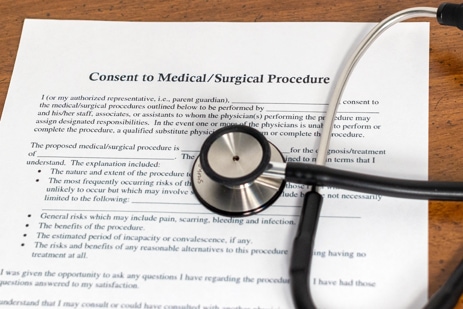When an individual suffers complications after surgery or sustains injury under the care of a medical professional, they often seek legal advice. Despite these complications, it’s often difficult finding an attorney to accept the case. There are several reasons why a medical malpractice lawyer may hesitate in pursuing the case; this article summarizes a few key reasons.
1. The Injury Doesn’t Qualify as Medical Malpractice
Experiencing pain after surgery or suffering complications after a medical procedure does not automatically qualify as “malpractice.” For instance, if the procedure was performed correctly within normal industry standards, then malpractice is not present. In other words, malpractice doesn’t exist if the medical professional did not make an error, regardless of the outcome.
It’s certainly upsetting to experience negative results after entrusting a professional with your health; however, there’s a certain level of accepted risk to every surgery/procedure. These risks are outlined in the consent form signed prior to the procedure. In short, medical malpractice requires “negligence” from the healthcare professionals along with several other factors.
There are numerous guidelines in establishing whether or not an injury sustained while under the care of a medical provider qualifies as malpractice. These guidelines include:
Formal patient-doctor relationship established
The medical professional breached their duty of care by acting with negligence
This negligence must cause significant injury to the patient
2. Statute Of Limitations
 There is a time limit on filing a medical malpractice claim. In the legal world, this time limit is called a “statute of limitations.” The duration of the statute of limitations varies based on several factors. One of the main factors involved is the state where the injury occurred. For instance, in Florida, most malpractice claims carry a 2-4 year statute of limitations.
There is a time limit on filing a medical malpractice claim. In the legal world, this time limit is called a “statute of limitations.” The duration of the statute of limitations varies based on several factors. One of the main factors involved is the state where the injury occurred. For instance, in Florida, most malpractice claims carry a 2-4 year statute of limitations.
With that said, there are several exceptions to this 2-4 year limit. For example, if a minor child was involved, this time-frame may be extended. Other exceptions involve fraud, intentional misrepresentation, or concealment. In these instances, the statute of limitations can be extended to a 7 year maximum limit.
An attorney is unable to pursue claims that fall outside the statute of limitations. This is why it’s so critical to have your case reviewed by a medical malpractice attorney as soon as possible.
3. The Medical Injury Isn’t Serious Enough
Simply put, in order to successfully pursue a medical malpractice case, there’s a great deal of time, effort, and resources required from a law firm. Keep in mind, there’s a good chance your attorney will have to face a team of lawyers provided by the hospital and/or insurance company that will aggressively oppose a potential lawsuit.
With this in mind, if the injury doesn’t have significant “monetary value,” then it’s economically infeasible for a law firm to pursue the case.
If you’re wondering whether or not you have a “good case,” it’s important to consider the extent to which the injury has impacted your daily life or will potentially impact your life long term. If the injury only caused short term discomfort/pain there may not be sufficient monetary compensation available to warrant a potential trial or pay the necessary legal fees in obtaining a settlement.
4. Where The Injury Occurred
Many law firms are only licensed to practice law in their individual state. For instance, a medical malpractice law firm in Florida may not pursue a claim which occurred in Georgia. As a result, it’s recommended to work with an attorney in your state or search for one within the state which the injury occurred.
5. No Medical Malpractice Insurance
Other than geographic location, the hospital/physician that caused injury is another key element in determining whether or not a law firm will accept your case. To put this in perspective, hospitals, surgeons, etc. are generally protected by medical malpractice insurance. This insurance will ultimately provide compensation for your injuries if your claim is successful.
Unfortunately, certain states such as Florida allow doctors to practice without medical malpractice insurance. This is commonly referred to as “going bare.” As a result, injuries caused by uninsured physicians leave victims with little to no chance of receiving significant compensation.
As previously stated, pursuing a medical malpractice case requires extensive time and resources and if there’s a lack of potential recoverable monetary value, a lawyer has less incentive in pursuing a claim.
In summary, there’s an economic reality in pursuing medical malpractice cases. Simply put, it’s very difficult for a medical malpractice lawyer to sue hospitals/medical practices. Successful malpractice suits require clear evidence that negligence on behalf of the medical professional(s) caused catastrophic damage to the alleged victim.